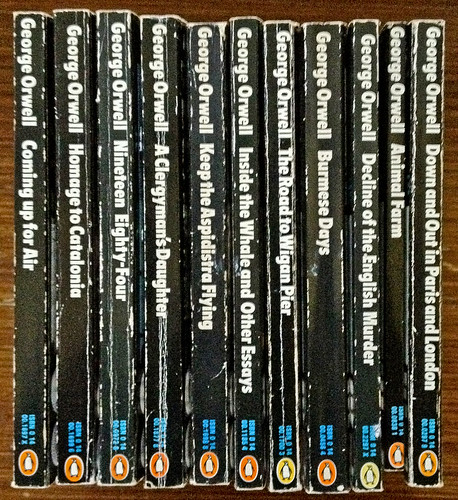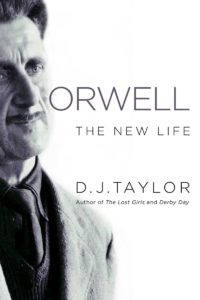Solving George Orwell’s God problem
Orwell #Orwell

On the flyleaf of D.J. Taylor’s new biography of George Orwell, there is a reminiscence of one of his friends:
“I spent a day with Orwell just before he died. I sat on his sanatorium bed, tried to smoke the frightful cigarettes he insisted on making for himself. I heard him say, ‘The problem of the world is this. Can we get men to behave decently to each other if they no longer believe in God?’ ”

(Amazon)
I think this captures why Orwell is of great interest to us Christians. In a generation of writers liberated from religious ideas, he stood out noting the consequences of the loss of a faith perspective.
His insight reminds me of Matthew Arnold’s “Dover Beach” with its elegiac melancholy about “the Sea of Faith” receding around the world. Like Arnold, Orwell was a man full of contradictions and seemed to hear faith’s “melancholy, long, withdrawing, roar, / Retreating to the breath of the night wind, down the vast edges drear/ and naked shingles of the world.”
Malcolm Muggeridge, Orwell’s friend, had seen the collapse of the Enlightenment’s project of man’s liberation with God. In his review of Muggeridge’s book, “The Thirties,” Orwell said,
“It was absolutely necessary that the soul should be cut away. Religious belief, in the form in which we had known it had to be abandoned… For two hundred years we had sawed and sawed and sawed at the branch we were sitting on. And in the end, much more suddenly than anyone had foreseen, our efforts were rewarded, and down we came. But unfortunately, there had been a little mistake. The thing at the bottom was not a bed of roses after all, it was a cesspool full of barbed wire.”
Orwell noted that Muggeridge showed no sign of believing in God himself. “Or at least he seems to take it for granted that this belief is vanishing from the human mind” he said. “There is no wisdom except in the fear of God; but nobody fears God; therefore, there is no wisdom.”
Muggeridge, it turns out, went on to famously convert from agnosticism to Catholicism, a pilgrim’s progress of decades helped by a personal relationship with St. Teresa of Calcutta.
I was a recently ordained priest when Muggeridge and his wife became Catholics, and I wrote him a letter congratulating them both, and saying that I had offered a Mass for their intentions. I received a very nice note of thanks from them. But their friend Orwell had been long dead by then.
In his memoirs, Muggeridge said of Orwell that he had “the desperate intensity of an utterly honest mind.” Perhaps that explains the uncanny clairvoyance Orwell had about the world.
When the literary left still romanticized Stalin’s dictatorship, Orwell wrote “Homage to Catalonia,” exposing Soviet corruption in its involvement in the Spanish Civil War.
In 1945, “Animal Farm,” his allegory of Soviet Russia under Stalin, was published. Many publishers, including T.S. Eliot, refused what became a great classic because it was regarded as “difficult” when Britain and the U.S. were allied with the Soviet Union.
In “1984,” Orwell showed his prophetic gifts in imagining the future as totalitarian.
The adjective “Orwellian” was recently used by a judge decrying government censorship exercised on social media. The writer invented the word for a reality that seems closer to us every day. It is illustrative that in 2022 in the midst of the war with Ukraine, “1984” became a bestseller in Russia.

The George Orwell novels ‘1984’ and ‘Animal Farm’ in Russian. (Shutterstock)
Many aspects of “1984” read like our present-day headline: A seemingly never-ending war; a “ministry of truth” that manipulates and distorts the past by rewriting history; even back issues of newspapers have to be cleaned up and “unpersons” erased from the archives.
Moreover, Orwell’s Newspeak was a politically correct language that was meant to disguise reality. “Thinkpol” is a government agency in charge of controlling “thoughtcrime” — think of the routine censorship of not only social media, but also of so-called “legacy” media. Anyone familiar with the fight of pro-life organizations for space on the internet will recognize how prescient Orwell was about the ability of an ideological dictatorship to control information.
Orwell imagined “telescreens,” which were like two-way mirrors that allowed the government to constantly spy on everyone — foreshadowing the cyber invasion of our private lives. He also predicted the pornography pandemic. His “proles” are provided pornography and alcohol to keep them subservient.
The evidence is clear that Orwell was prophetic, even without being a believer. A contrarian who defied categorization and was full of contradictory instincts, Orwell seems a curious combination of valiant intellectual honesty with a great deal of self-pity and self-centeredness. He was alert to society’s hypocrisy; about his own, perhaps not so much.
“Orwell: The New Life” is Taylor’s second take on his subject. In 2003, Taylor published “Orwell: The Life.” Since then, caches of letters have been unearthed which motivated the biographer to write another tome.
Some have asked whether another biography was necessary, since there are shelves of them already. Orwell himself ordered no official biography be written of him.
Some reviewers note that Taylor’s new biography is not chock-full of tremendous revelations. However, a critic in The Times of London said the value of the book was to make one “reread Orwell’s work.” The recommendation comes with the promise, “And there he is: this fraudulent, irritating, cheating, nasty bastard, writing the best essays in the English language.”
Orwell’s work, the reviewer concludes, “probably always will be” hard to ignore. Even harder to ignore is the perception this unbeliever had about the philosophical underpinnings and the psychological consequences of modern atheism. For Christians living in a confused and unbelieving society, the insights of this secular prophet are very useful for our apologetics and well worth our study.